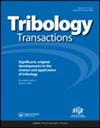An Investigation Into the Influence of Viscosity on Gear Churning Losses by Considering the Effective Immersion Depth
IF 2.2
3区 工程技术
Q2 ENGINEERING, MECHANICAL
引用次数: 0
Abstract
Abstract We present an experimental investigation into the influence of oil viscosity on gear churning losses in splash-lubricated transmission systems. The inertia rundown method was used to perform tests on a single gear within a cylindrical housing with several oils of different viscosities at several immersion depths. A complex and nonmonotonic relationship between churning torque and viscosity was observed that was highly influenced by the rotational speed, with higher viscosity oils resulting in lower churning torque at higher speeds in some cases. This was attributed to a reduction in effective immersion depth due to oil being centrifugally distributed around the casing by the rotating gear, an effect that was observed to be more pronounced with higher viscosity oils. An effective immersion depth parameter, dependent on the rotational speed of the gear and the lubricant viscosity, was defined to account for this phenomenon. Gear churning losses could be better predicted using an existing empirical model when this parameter was used instead of the nominal immersion depth as is usually done.考虑有效浸入深度的粘度对齿轮涡流损失影响的研究
摘要我们对飞溅润滑传动系统中油粘度对齿轮搅动损失的影响进行了实验研究。惯性滑行法用于在圆柱形外壳内的单个齿轮上进行测试,该外壳具有几种不同粘度的油,在几个浸入深度下。观察到搅拌扭矩和粘度之间存在复杂且非单调的关系,这在很大程度上受到转速的影响,在某些情况下,较高粘度的油会在较高速度下产生较低的搅拌扭矩。这归因于由于旋转齿轮将油离心地分布在壳体周围,导致有效浸入深度降低,观察到这种影响在粘度较高的油中更为明显。定义了一个有效的浸入深度参数,该参数取决于齿轮的转速和润滑剂粘度,以解释这种现象。当使用该参数而不是通常使用的标称浸没深度时,使用现有的经验模型可以更好地预测齿轮搅拌损失。
本文章由计算机程序翻译,如有差异,请以英文原文为准。
求助全文
约1分钟内获得全文
求助全文
来源期刊

Tribology Transactions
工程技术-工程:机械
CiteScore
3.90
自引率
4.80%
发文量
82
审稿时长
4 months
期刊介绍:
Tribology Transactions contains experimental and theoretical papers on friction, wear, lubricants, lubrication, materials, machines and moving components, from the macro- to the nano-scale.
The papers will be of interest to academic, industrial and government researchers and technologists working in many fields, including:
Aerospace, Agriculture & Forest, Appliances, Automotive, Bearings, Biomedical Devices, Condition Monitoring, Engines, Gears, Industrial Engineering, Lubricants, Lubricant Additives, Magnetic Data Storage, Manufacturing, Marine, Materials, MEMs and NEMs, Mining, Power Generation, Metalworking Fluids, Seals, Surface Engineering and Testing and Analysis.
All submitted manuscripts are subject to initial appraisal by the Editor-in-Chief and, if found suitable for further consideration, are submitted for peer review by independent, anonymous expert referees. All peer review in single blind and submission is online via ScholarOne Manuscripts.
 求助内容:
求助内容: 应助结果提醒方式:
应助结果提醒方式:


